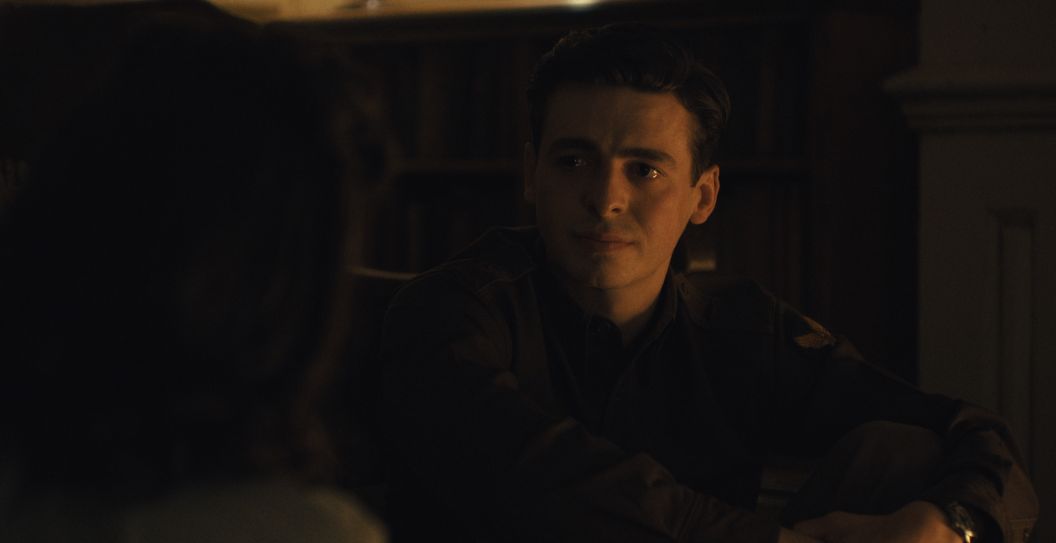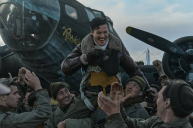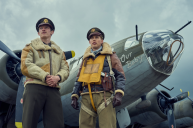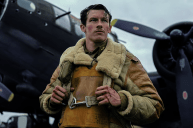Warning: Spoilers ahead for "Masters of the Air" Episode 6.
Part 6 of "Masters of the Air" examines the rhythms of war, from the literal rhythm of wartime folk music to the metaphorical rhythm of an airman's daily routine. These elements highlight the drastic tempo changes experienced by the men of Hundredth — a squadron scattered across Europe and living distinctly unique versions of the war. Some of the men still grind away at the air base in England, waiting with dread for that orange light to flare to life and corral them onto their planes for another mission. (Thirty-two of the 35 original crews have been shot down, so the men are no longer wondering if their ticket will be punched, but when.) Others get a much-needed break from battle, spending weeklong retreats at gorgeous castle-like estates. And others have been captured by the Nazis and penned into the brutal conditions of German POW camps.
The musical score carries us between these disparate scenes to startling effect. Lt. Harry Crosby (Anthony Boyle), sent to Oxford for some R&R after the death of his best friend Bubbles, attends a concert where a singer performs a song that celebrates the Allies uniting against fascism. Her upbeat melody continues to play as we cut to Allied POWs being herded off a train, harassed by screaming Nazis and snarling dogs.
Here's our full analysis of "Masters of the Air" Episode 6, along with historical facts to provide background on the horrors of the war this episode brought to life.
'Rosie' Gets His Groove Back
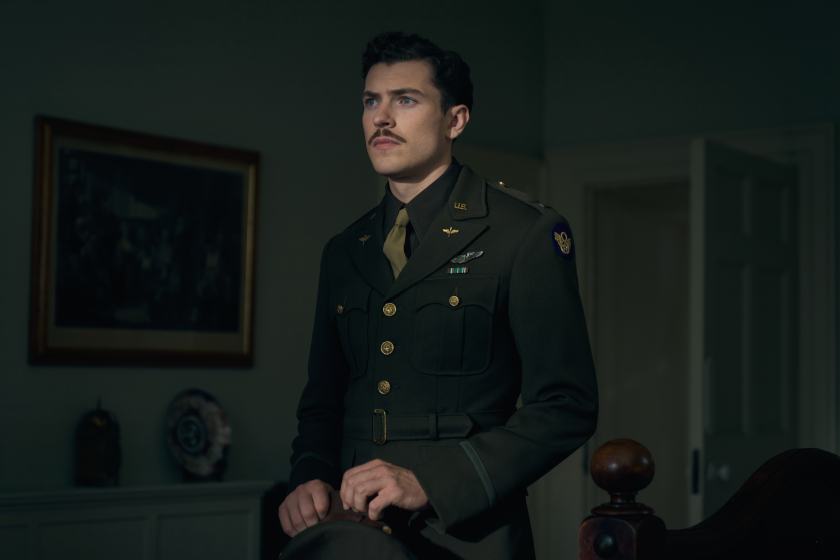
AppleTV+
The men have used music to alleviate tension between dogfights. In Episode 5, as Robert "Rosie" Rosenthal (Nate Mann) and his men awaited another strafing run from German fighters, Rosie absurdly hummed a spirited rendition of an Artie Shaw jazz song. A man in his crew recalls Rosie's little solo as the crew relaxes at the posh Coombe House. The man says listening to Rosie's song through his headset reminded him he wasn't alone in the fight — he wasn't as "scared s—-less."
Rosie also uses music to describe his perilous regimen. He likens the groove of daily missions to playing the drums — and he resents the mandated R&R at Coombe House for ruining that groove. "I was in a rhythm, you know? Three days, three missions, three wheels down. Boom, boom, boom. It's like Gene Krupa," he says, referencing the famous American jazz drummer. "You don't stop Gene Krupa in the middle of a drum solo, do you?"
Rosie wants to maintain his rhythm, to be sure. But as the only pilot from the Hundredth to return from the Münster raid, he also feels a substantial amount of survivor's guilt. How can he enjoy croquet or fox hunting or fresh coffee served by beautiful, flirtatious women when so many of his fellow airmen are either KIA or MIA?
At the end of the episode, Rosie is permitted to resume his solo. He even drums his hands on the side of the B-17 before climbing into the hatch. The background music picks up his cue, playing the jazz he hears in his mind as his palms strike the metal. The swinging trumpets bleed into the subsequent shot of Allied prisoners entering the ruddy POW camp, where the brass is replaced with blaring sirens.
'Terror Flyers' and the Rüsselsheim Massacre
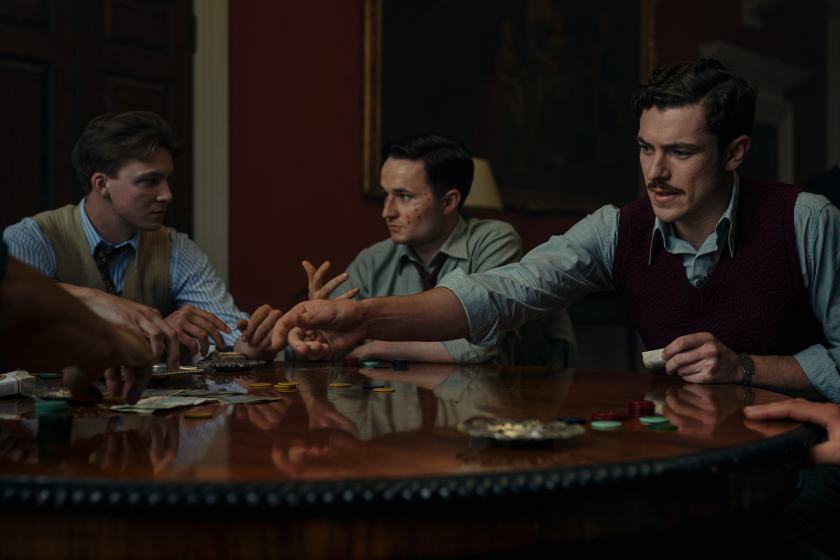
AppleTV+
The scenes without music take on a sort of rhythm as well. In one instance, Rosie watches his men shout with joy as they splash around in a river at the picturesque Coombe House. Hard cut to a German detainment center, where the angry shouts of Nazi officers bounce off the dark, dank walls. Visually, the scenes couldn't be more different, but the distant shouts in each scene give them a sonic symmetry. The juxtaposition is eerie. And it's made all the more disturbing as the Allied POWs watch a train trundle past, its cars boarded up and crammed with sobbing women, their arms reaching through the slats in supplication. Back in England, Rosie wouldn't have known about the Holocaust at this point in the war — that discovery wouldn't come until the German forces pulled back, leaving their concentration camps behind for the Allies to find — but suddenly, his guilt over a week of luxury feels all the more qualified.
These scenes of German atrocity are witnessed through the eyes of John "Bucky" Egan (Callum Turner). Downed in Episode 5, his journey begins in the forest as he attempts to evade capture, but he's quickly caught by the Germans. En route to the POW camp, he and a group of prisoners are led through the German city of Rüsselsheim, a key industrial area that had just been bombed by the Canadians. With the train tracks damaged by the bombing, guards must escort the POWs through the city on foot. Bucky sees the horror of the bombing raids at ground level yet again. But this time, it isn't just one building reduced to rubble — the entire city is burning. We see on his face that the guilt over bombing civilians has crept back into his psyche. Enraged German civilians, who were in the middle of collecting their dead, attack the POWs, calling them "terror flyers." Guards attempt to push back the crowd at first but soon join in, shooting the Allied prisoners. Bucky survives — saved by the guard's empty magazine — and is knocked unconscious instead. He's piled onto a cart with the dead and pulled into the woods, where he escapes once more.
This war crime became known as the Rüsselsheim Massacre, but in real life, Egan wasn't one of the airmen involved. Shockingly, almost everything else happened exactly as the scene showed it. The downed airmen were attacked by civilians despite their insistence that it wasn't they who had bombed the city. And a Luftwaffe official did indeed line up the men and shoot them. Two were spared when he ran out of ammo. These two were loaded onto a cart with the dead and hauled toward the woods, but when an air raid siren sounded and the guards went fleeing for cover, they escaped. Both were caught again and sent to a POW camp, where they would eventually survive the war.
In the series, Egan also finds himself caught by the Germans soon after his escape. He is interrogated by a Nazi official named Lt. Haussmann (Louis Hofmann). Hofmann channels Christoph Waltz's Hans Landa, a la "Inglorious Basterds" — calm and exceedingly polite yet rife with menace. Egan doesn't break, however, and refuses to give up any information to Haussmann. Instead, he answers each question with the two pieces of data the interrogator already knows: his name and military ID number.
Buck and Bucky Reunited
At the end of the episode, Egan and a shipment of prisoners are swept into a POW camp, where he spies his old crewmates rattling the wire fence. He asks about his best friend who was shot down, Maj. Gale "Buck" Cleven (Austin Butler), but his voice is lost in the commotion. Answering for them, Cleven shouts out, "John Egan! Your two o'clock!" Cleven appears along the fence, smiling that rock-star smile, his face impossibly clean and well-kempt amid the sea of muddy and battered men. Perhaps filmmakers intended for his pristine appearance to have an angelic effect — as if he'd risen from the dead — but it's almost comical how out-of-reality his presence feels. Nevertheless, I can't help but feel excited to see Buck and Bucky reunited. As the preview for Episode 7 suggests, they intend to keep fighting despite their circumstances, engaging in all manner of sabotage and espionage from the confines of the POW camp.
New episodes of "Masters of the Air" premiere Fridays on Apple TV+.
